{youtube}CU6eyt6SE4U{/youtube}
{youtube}GWGNPFI-MtE{/youtube}
{youtube}C9HdNezn4Eo{/youtube}
{youtube}FE-iUyL61fc{/youtube}
 A life in the
football wilderness
A life in the
football wilderness
by Justin Bryant
Bennion Kearny, £6.99
Reviewed by Ian Plenderleith
From WSC 320 October 2013
Unknown American goalkeeper Justin Bryant begins his memoir in the middle of a nature reserve watching alligators, describing the “sheer improbability [of] these Jurassic river dragons”. That’s the first thing that strikes you about Bryant – he doesn’t need a ghostwriter. And he’d be the first to admit that’s just as well, because his football career didn’t pay him enough to afford one.
There have been a good number of books by lower-level players in recent years describing the nitty-gritty of life at the game’s hard end, and long may struggling ex-pros continue to counter the egregious banality of the mailed-in Premier League star’s cynical book, hacked out in a few days for a six-figure advance. Small Time is an excellent prototype for any former player with a good story to tell. Bryant is honest, thoughtful, economic and introspective enough to realise his own shortcomings as a player and a person.
Growing up a fan of the Tampa Bay Rowdies in the North American Soccer League, and idolising goalkeeper Winston DuBose, Bryant becomes a decent high school goalkeeper and wins a scholarship to Radford University in Virginia. There his “sudden, terrible temper” during games wins him few friends and his scholarship is rescinded because of low grades. He returns to Florida, “a college flameout with no job”, and starts to play for the Orlando Lions, a team of college and ex-pro players that includes DuBose. From here on it’s a fragmented, frustrated career that takes him to various clubs including Brentford, Boreham Wood and Dunfermline Athletic, punctuated by spells back in Florida, all the time on low wages (if he gets paid at all), working supplementary menial jobs, and indulging in sporadic bouts of heavy drinking to drown his self-doubt.
While there are just enough glimpses of success and professional satisfaction to keep him motivated, Bryant’s career suffers because of his unwillingness to put in the extra training he knows is necessary to improve and impress, and because of his chronic pre-game nerves. His crippling fear of making an error and costing his team the game – a full-time burden that only a goalkeeper has to bear – leads to a debilitating, and undiagnosed, stomach condition that he carries with him for years and which only subsides when he steps back from football. Making a comeback for the Lions in his 30s after being lured by the prospect of $50 a game just for sitting on the bench, Bryant suddenly finds he is the first-choice keeper and writes: “My gut rippled with excitement and dread, a feeling I hadn’t had in years. Nothing about it was pleasant.” When he plays well, he’s above all else “relieved that I hadn’t made an idiot of myself”.
However, there’s far more to this book than the author’s insecurities. This is a finely written chronicle of butt-end semi-pro football, its moronic dressing-room culture, the tedium of travel, the philosophy of goalkeeping, the political perils of ever-changing coaches and team-mates and the constant, pressing need to prove yourself, game after game, only to realise after several years that “being part of a team… apparently didn’t suit my personality”. Being a writer, though, clearly does.